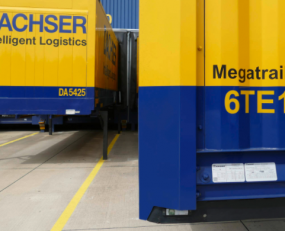
DACHSER has decided to now exclusively acquire ‘mega trailers’ when purchasing new semi-trailers in Germany. Because of their more generous cargo space dimensions – with otherwise the same length and width – DACHSER claims the mega trailers achieve better fuel economy than standard semi-trailers, especially over long distances. Full conversion of the German fleet is scheduled to be completed by 2027, with some 680 new mega trailers in total. In the next few years, DACHSER will also start replacing its fleets in the 24 other European countries where it is represented through its European Logistics business line.
The so-called mega trailers have the same length and width as a standard semi-trailer, and their overall height remains below 4 m, the maximum vehicle height permissible in Germany. They boast an additional 20 cm in interior height, as the loading area is just under 100 cm above the road surface. This results in a total of 8 cu m more cargo space. With double‑deck loading, a mega trailer offers space for 67 euro pallets. It thus comes close to the capacity of a semi-trailer truck with two swap bodies—however, as this offers five more pallet spaces than the mega trailer, it will remain DACHSER’s preferred option for now.
“The limiting factor in the groupage business is usually not the maximum permissible total weight of 40 metric tonnes, but the available loading volume. More cargo space means better capacity utilization; in the case of the mega trailer, that can be as much as 18%. This is efficient and also good for our carbon footprint, as it saves us trips,” said, Christian Schütz, Department Head Technics/Technical Purchase at DACHSER.
In pursuing this strategy, DACHSER says it is focusing on efficient logistics and technological innovation. The company believes this is the best way to achieve the 2-degree target set by the Paris Agreement as well as the climate protection targets of the European Union and many other countries over the medium and long term. To this end, DACHSER works together with customers and partners who are also keen to actively shape how logistics moves to adopt low- and zero‑emission technologies. DACHSER concentrates its climate protection initiatives on four key fields of action: process efficiency, energy efficiency, research and development, and corporate citizenship. The latter refers to a commitment to society and social issues that go beyond DACHSER’s own direct business interests.
Source: DACHSER